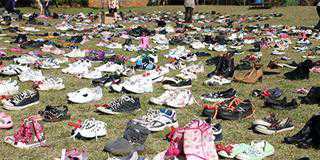
Hendrik has lived in Argentina for 15 years, and has an academic background in international relations from the Universidad del Salvador. He is the owner of Laurik International, a company that consults with agro-industrial businesses operating between South America and Southern Africa.
He will form part of the tour group, which will leave to Brazil on 25 April and return 5 May. This is the first Farmer’s Weekly tour to Brazil, and will include farm visits, informative talks on the country’s agri sector, and a visit to Show Rural, one of Brazil’s biggest farming expos.
Tour bookings can be reserved by 16 February, contact Yolanda Barkhuizen at XL Boland Travel on 021 872 1581 or [email protected]. For more information on the tour, click on the link: FWBrazil
Here is a transcript of the discussion:
Q. You’ve been taking South African farmers to Argentina for years; why do you think Brazil is worth a visit?
Hendrik: Brazil has a growing role in the global economy and agriculture is one of the country’s most important sectors – primary production and the processing and value adding parts of the chain. It is relevant to understand what is happening in Brazil and how the people there see the future. We will talk to people from the government, farmers and people from the equipment manufacturing and food processing sectors. Farmers in South Africa cannot afford to ignore Brazil and the role it will play on domestic markets and their internal and international competitiveness. The objective of the tour is to see what the future holds and prepare for it with an inter-disciplinary perspective.
Q. There are six biomes in Brazil. Where does most of the agricultural activity take place?
Hendrik: Farming takes place all over Brazil but commercial farming is based in the southern, eastern and central parts of the country. Sugarcane is grown to the central north as well and it is one of Brazil’s main crops.
Q. The itinerary says that the group will be visiting IMBRAPA. What is the main focus of their research?
Hendrik: The model used in Brazil and Argentina is really outstanding as far as the interaction between farmers and the research institutions financed by government is concerned. In Brazil the work is done by IMBRAPA and they have various research stations that are spread throughout the various climatic and productive regions of the country. Each one specialises in different themes and crops. They have extension offices with support staff that work in the field with farmers to find out what their problems and realities are and to make sure they are aware of the new technologies and findings developed by IMBRAPA and other c-operating institutions. Extension work plays a vital role in ensuring that IMBRAPA remains relevant and useful to farmers and that the work is practical. Our first visit on the tour will be to the IMBRAPA offices near the city of Sao Carlos where we will have an opportunity to talk to researchers and extension officers.
Q. Is there much dairy farming going on in Brazil and if so in which region?
Hendrik: Taking into account the size of the country and its population of over 200 million people the short answer is yes, dairy farming is important in Brazil; but there are a great number of very small farms and then there are the bigger commercial farms. There are approximately 1.4 million farms in the country with an average of 17 cows but the main dairies are concentrated near the big cities in the state of Sao Paulo and also to the south.
Q. What is the weather like in Brazil in April/May? Does one need to have specific vaccinations to visit the country?
Hendrik: It’s always difficult to make weather predictions, but what I can say is – Brazil is a tropical country and temperatures will probably be on the hotter side, but it is important to prepare for rainy days and the odd cold spell. In absolute terms temperatures can be expected to vary between 20°C and 30°C. Vaccinations: It is important to have a yellow fever injection at least 2 weeks before leaving South Africa. There is little real risk of contracting this disease but airport authorities on both sides have the power to stop any person from embarking or disembarking without the yellow fever vaccination and the original documentation to show as proof.
Yolanda (travel agent): A yellow fever vaccination is compulsory. Recommended vaccinations are Hapatitus A and B. I would suggest checking with your local travel clinic about what they suggest, but it’s only yellow fever that is compulsory.
Q. How many farmers are there in Brazil? What is the ratio between commercial and smallholder farmers? How big does a sugarcane farm have to be, for example, to be considered commercial?
Hendrik: It’s difficult to give you a concise answer to that question, as it depends on the region and what you consider commercial. The business culture differs in various regions of Brazil but to give you some general statistics: Brazil has 5,175,489 million farms and 4,367,902 farms in Brazil have land plots with less than 10 hectares. However, small farms occupy only 24.3% of the total farmland. This however differs widely from region to region as the southern and central parts of the country are more for commercial farmers.
Q. The Pampas looks like a pretty small part of Brazil and apparently this grassland has fragile, sandy and sensitive soils which have been degraded by agriculture with an accompanying loss of diversity and socio-economic opportunities. Is this obvious when you tour the Pampas region?
Hendrik: It is true, Brazil has such a large surface with many regions and I would say that up to about 20 years ago farming was done in a non-sustainable way and that is when these delicate eco-systems suffered a lot of damage. Since then most commercial farming in Brazil is done with the No-Till method and don’t see a lot of erosion and degradation when travelling through parts of Brazil where crop-farming is done.
Q. Can you tell our readers about the cost of the trip, and when is the last day to book tickets?
Yolanda: The tour cost is R42 460 per adult sharing a room and R54 460 per adult single. A 50% deposit is required by 1 February and the remainder by 1 March. The flights are on South african airways out of Johannesburg which is very convenient.
Q. How are the relations between the farming sector and the Brazilian government? How does it differ from Argentina’s situation?
Hendrik: I would say that the relationship between farmers and the government in Brazil and Argentina are quite different. Brazil has had four consecutive presidential terms where the government has had a coherent policy towards the agro-industrial sector as it looks for an increased production and an expansion of food production and exports. I wouldn’t go as far as to say that they have a friendly relationship, but they work together on long-term aims and currently there is a lot of investment in rail, road and shipping infrastructure. Brazil was a very poor country during the 1980s and it needed to turn that around to ensure food security. The country now produces a vast amount of food, with and without adding value.
Q. Is the tour for farmers only, or do you think people who do not farm, but have an interest in farming and/or Brazil will also enjoy the tour? Will there be time for tourist sightseeing or is the trip strictly agricultural?
Hendrik: This tour will be enjoyable for everybody with even a small interest in farming. We will visit places and regions that you will not find in most itineraries. We include a tourist/sightseeing day in Sao Paulo on the last Saturday, but we strongly advise everybody to take advantage of their visit to Brazil and extend their stay to visit the legendary Río de Janeiro, Iguassu Waterfalls and the Amazon Rainforest. The plane tickets can easily be adjusted to suit visitors who want to extend their trip. Yolanda Barkhuizen at Boland Travel can give you more information on how this works.
Yolanda: To extend the ticket is no problem at all. Depending on how long you want to extend for, we’ll just need to check availability on flights to see if the fare would be the same. If the flight as well as the same class booked is available, the cost of the flight ticket should remain the same. You will then still be part of the group flying out, but will return later.
Q. There is a large landless movement in Brazil where landless folk occupy farms. How big an issue is it for the agricultural sector? Are there fears it would compromise food production?
Hendrik: Yes, it is true that Brazil has a large movement of landless people. This is actually more of an issue in the central north and north of the country, and the government has been engaging with them during the last ten years, to try and address their concerns and problems. I would not say that this issue will be resolved soon, but it is definitely not growing and it is not a threat to food production in Brazil on a national level.
Q. Many of us can’t speak Portuguese; how will we be able to communicate with residents and farmers?
Hendrik: It is true that people in Brazil speak Portuguese and very little English but we will have full-time translators with us on the trip. The locals are very friendly and will also try and understand and help whenever and wherever possible. They love foreigners and welcome visitors to their farms.











